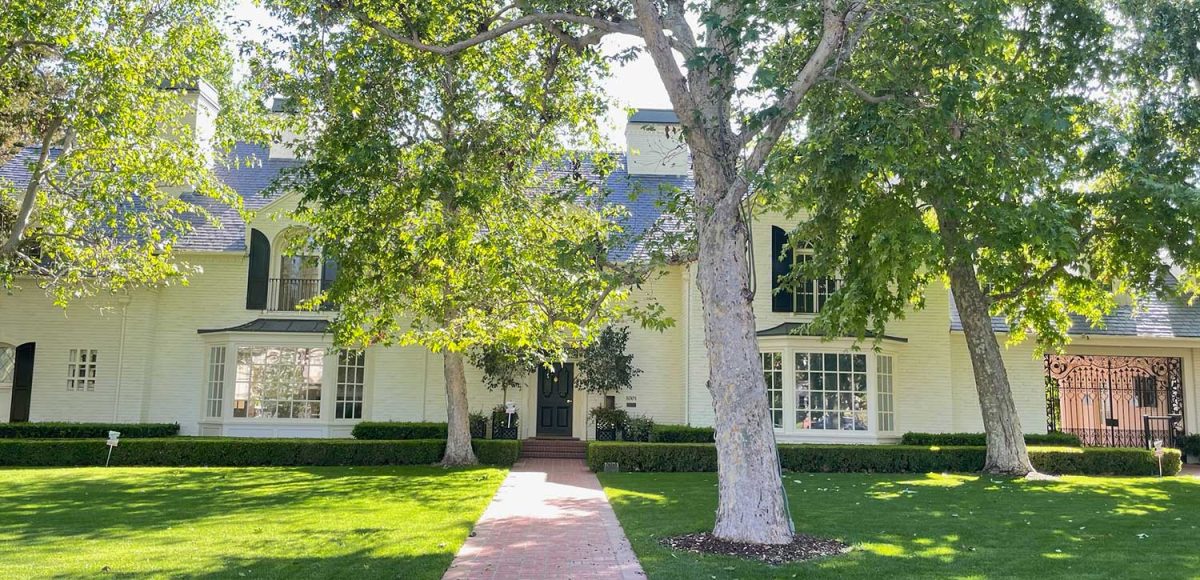After an at times rancorous debate over the future of a lavish Beverly Hills estate, the City Council affirmed the previous findings of staff that the house at 1001 N. Roxbury Drive is not historic. The meeting stretched long past midnight – the second time, for this particular issue–and forced the Council to grapple with potential shortcomings of the city’s tools to protect historic buildings.
The 10,000-square-foot property was built in 1942 for Mildred Naylor by Beverly Hills master architect Carleton Burgess in the Regency Revival style. Many celebrities and luminaries have been neighbors to the house, including George and Ira Gershwin, Lucille Ball, Diane Keaton, and Madonna, but itself has never been owned by a “person of great importance,” according to a staff report.
In 2021, the new owner of the property, StubHub co-founder Eric Baker, who purchased the house for over $39 million in 2020, requested that the city issue a certificate of ineligibility, certifying that the home does not have historic value.
Both Baker and his wife, Nicole, spoke before the Council at the June 21 meeting, emphasizing their connections to the city as natives.
“I love Beverly Hills,” said Baker. “It’s my hometown. I can’t imagine a better community to raise a family.”
“Eric and I have followed the process and all of the city’s rules to the letter,” Nicole said. “As we have clearly laid out, the facts confirm that the house we own is not historic.” The certificate prevents the Cultural Heritage Commission or the City Council from designating a property as a landmark for seven years, giving homeowners a level of reassurance to move ahead with changes to the property that would otherwise be barred were it deemed historic. The process for receiving a certificate is part of the city’s Historic Preservation Ordinance first passed in 2012.
Director of Community Development Ryan Gohlich granted Baker’s request in March 2022. Before that, Baker had to submit a report by a historic consultant showing that the property fails to satisfy the criteria for landmark status set out in the Historic Preservation Ordinance. That report then went through a peer review process by the city’s own historic consultant.
Based on the report and the city’s own review, Gohlich found that the home satisfied the requirements for a certificate of ineligibility. Part of this decision rested on the fact that the house “was not the subject of any publications or architectural awards discussing or honoring the property for its design and merit.”
The decision caught the attention of many in the city, including Cultural Heritage Commissioner Jill Collins, who flagged multiple articles about the house in publications like Luxe Interiors and Design and a Russian edition of Architectural Digest and argued that the existence of the articles contradicted Gohlich’s findings. Collins later surfaced more publications that discussed the property, an online article, a book, and a coffee table book.
The hearing attracted considerable attention from celebrities including Candy Spelling, Ted Danson, Mary Steenburgen, and Diane Keaton.
Columnist and historian Alison Martino, who runs the Instagram account Vintage Los Angeles and has previously spoken out in support of the home, took to Twitter to mourn the outcome of the hearing.
“Last night we lost the fight to save 1001 Roxbury Drive,” she wrote. “Each day our city seems to be losing the magic that made it what it once was.
Even while some Council members expressed misgivings about their votes, a majority felt that the existing rules prevented them from overruling staff on the certificate. All but Councilmember John Mirisch voted to affirm staff’s original decision.
Councilmember Robert Wunderlich reluctantly voted to affirm the certificate of ineligibility, declaring the moment “a sad day for Beverly Hills” and “a day that we will regret.” But, he said, that his role on the Council is to “enforce the rules we have in place.”
“I hope that the future City Council will very quickly move to change the statute so that this doesn’t happen again,” he said.
Councilmember Lester Friedman felt that there was not “any evidence of it being of exceptional quality.” Although the house had been published in the magazines and books brought before the Council, the articles focused on the interior design, not the architecture, Friedman said.
Councilmember John Mirisch argued that the house was iconic enough to preserve and read a letter by film and television producer Jerry Bruckheimer and his wife, author Linda Bruckheimer, who own the historic home of Columbia Pictures co-founder Harry Cohn.
“If we are intent on preserving our historical treasures, we cannot have policies that make it harder to restore homes than to knock them down.”
Councilmember Julian Gold agreed with Wunderlich and Mirisch that “we have to do some work on this ordinance,” but like Wunderlich, could not square the existing rules with a rejection of the certificate.
“I think the language is clear. I think our decision may be painful, but it, too, is clear,” Gold said. “I think we have no option based on our own language, our own law, but to uphold the decision of the director.”
Mayor Lili Bosse, too, acknowledged that the Historic Preservation Ordinance “wasn’t perfect,” but said that “we don’t believe in bait and switch, and we don’t believe in rewriting the rules.” While the articles brought forward by Collins may have initiated the broader discussion by the Council, after consideration, Bosse did not feel they satisfied the requirements under the city’s ordinance.
“I do agree that we should look at this ordinance again,” Bosse added. “We can fine tune some of it.”
The Council will vote on a resolution documenting the finding on July 19. Even with the certificate upheld, the property owners must submit any new home on the property to design review, according to Gohlich.







